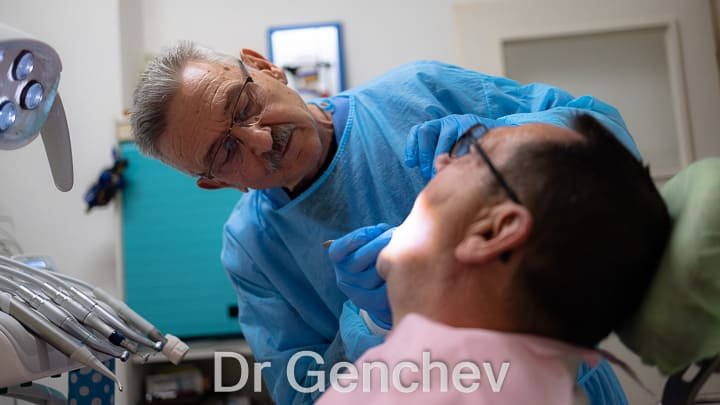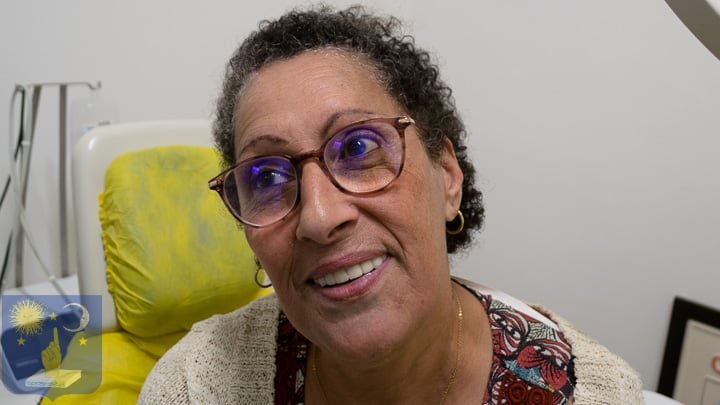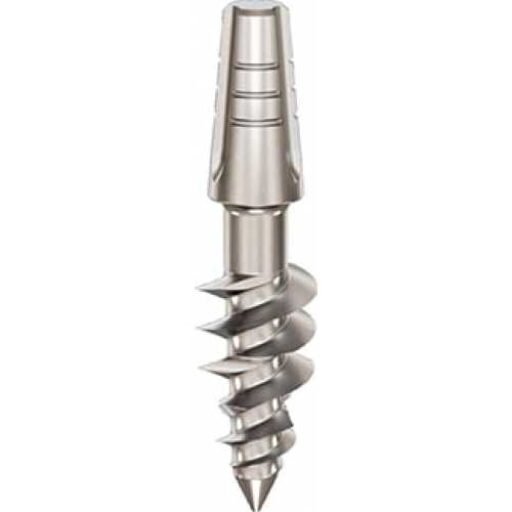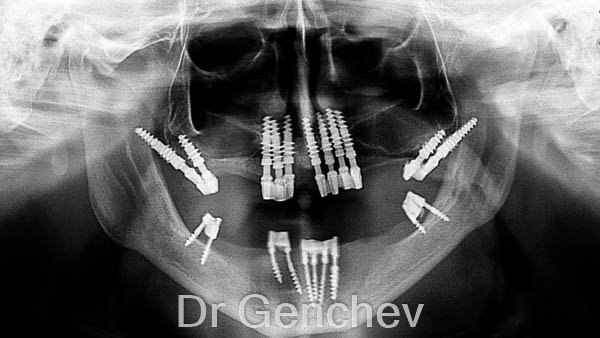How basal implants treat missing teeth with severe bone loss
Basal dental implants are the best solution for the full dental restoration of patients with missing teeth and severe bone loss. Basal implants avoid additional procedures like bone grafting and sinus lift.
Basal dental implants make it possible to recreate a full dentition for patients who have been edentulous for several years and have severe bone atrophy.

What is edentulism?
And what is bone atrophy?
Edentulism is missing teeth. It can be partial or total. Tooth loss leads to the resorption of the soft gum tissue that holds the tooth in place. The gums recede. This process of gum resorption takes 18 months. The volume of this cancellous bone decreases in height and density. It is called bone atrophy.
Treatment of edentulism with basal dental implants
How do basal implants treat edentulous patients with severe bone loss?
Basal implantology is the best solution for treating total or partial edentulism. Basal implants help recreate the natural functionality of the mouth to chew normally. It restores the patient’s dentition with a full set of fixed teeth.
Basal dental implants are the best solution because they are longer and fixed in the cortical bone, which is harder and deeper than the roots of the teeth. They are therefore unaffected by gum resorption.
Tooth loss
How do basal implants compensate for bone atrophy?
Basal implants can replace all teeth, even in patients who have been edentulous for several years. Basal dental implants are fixed in the cortical bone of the skull, which does not disappear with tooth loss.
Basal implants are placed along the entire length of the jaw to support full bridges and restore the patient’s full dentition.
Bone loss
Comment compenser l’atrophie osseuse?
Edentulism causes automatic resorption of the gum’s cancellous bone. It disappears over a period of 18 months. All that remains is cortical bone which is a deeper layer of bone. And basal dental implants that are longer are fixed in this cortical bone. They do not depend on the soft cancellous bone of the gums like conventional implants. So there’s no need for bone grafting or sinus lift.
Reversed dental occlusion
How do basal implants correct a reverse bite?
Reversed occlusion is also called reversed bite or underbite in orthodontics. A reversed occlusion is the result of tooth loss especially at the back of the jaws.
Tooth loss leads to a remodeling of the jaw bone. The jaws become deformed. The upper jaw shrinks in volume whilst the lower jaw widens. As a result the lower jaw positions itself in front of the upper jaw creating a reverse bite. The reverse occlusion is associated with a loss of height of the jaws.
In many cases, a basal implant can correct the reversed bite. A good implantologist will be able to correct the occlusion with good contact between the 2 jaws to chew normally
Before and after basal implants for edentulous patients
Dental restoration for toothless patients with severe bone loss.
The advantages of basal dental implants
What are the advantages of basal implants for replacing missing teeth?
Basal dental implants have been specially designed to replace missing teeth for patients that suffer from severe bone loss. Basal implantology has been developed for the full dental restoration of edentulous patients with severe bone atrophy.
Basal implants do not require bone grafting or sinus lift. Basal implantology is the only effective solution to restore the functionality of the mouth to enable normal mastication.
The disadvantages of conventional dental implants
What are the limitations of conventional dental implants for patients with missing teeth?
Conventional implants are too short, and are placed in the spongy cancellous bone that naturally resorbs after tooth loss. In conventional implantology bone grafting and sinus lift are necessary to compensate for the fact that classical implants are too short. In basal implantology, implants are longer and placed directly into cortical bone, which is unaffected by the resorption of the cancellous.
Limitations of the All on 4 system
What are the problems of using the All on 4 system to treat edentulism?
The All on 4 and All on 6 restorative systems are not a good solution for patients who are edentulous with severe bone loss. The All on 4 system restores the teeth at the front of the jaw, but does not restore the back of the jaws that are naturally designed for mastication. In conventional implantology the traditional implants that are too short cannot replace the molars.
As an option for severe bone loss under the sinuses conventional dentists recommend zygomatic dental implants that pass through the sinuses. But these zygomatic implants have risks and disadvantages.
Comparison of Basal and Traditional Dental Implants
Basal Implants

Long Implants

Hard Cortical Bone

No gum resorption
Traditional Implants

Short Implants

Soft Cancellous Bone

Gum resorption
Alternatives to dental implants
What are the alternatives to dental implants for treating missing teeth?
It’s difficult to replace missing without basal implants. The only alternative is to extract all the teeth and fit removable prostheses that are attached with glue. Over time, the bone holding the removable prosthesis resorbs and becomes too thin to hold the prosthesis, even with a lot of glue.

Dr Genchev
basal implant dentist
Dr Georgy Genchev is one of the best implant dentists who specializes in basal implants for the full dental restoration edentulous patients with severe bone loss and periodontal disease.
Dr Genchev practices in Bulgaria. He has many patients from the United Kingdom, Ireland, the USA, Canada and Australia.
Ask for a Free Consultation
Request a Call Back
Fast Response
For a fast response ask Dr Genchev for a free consultation via WhatsApp or send him an email.
This page is sponsored by Dr Genchev.
Ask us how sponsor content on the site of The Basal Dental Implant Association
How is basal dental implantation performed?
How do dentists place basal dental implants for a toothless patient?
In basal implantology, missing teeth are replaced by basal dental implants fixed along the entire length of the jaw, including behind the sinuses. Pterygoid dental implants are fixed behind the sinuses to replace the missing molars. The dentist can thus recreate the natural functionality of the mouth for the patient to chew normally.
The basal implantation is performed in one five-day visit. The implantologist will extract any teeth that are unstable or moving. Stable teeth, however, can be retained and trimmed for use as a support for the prosthesis. Where teeth are missing, he will add basal implants along the entire length of the jaw to create support points.
Typically, for edentulous patients the implant dentist places 10 to 12 basal dental implants on the upper jaw and 8 to 10 implants on the lower jaw to replace the missing teeth. The dentist might use teeth that are stable. Afterwards a full bridge of 14 crowns is placed on each jaw.
How much time to treat edentulism
How long does a full dental restoration take with basal dental implants?
With immediate-loading basal dental implants the dental restoration takes only 5 days.
Basal Implant Dentists Near Me
Where can I find a basal implant dentist near me to treat tooth loss with severe bone loss?

Dr Zawadka
Implant dentist in Poland.

Dr Genchev
Implant dentist in Bulgaria.

Dr Calin
Implant dentist in Romania.
There are very good basal implant dentists that practice full mouth dental restoration with basal dental implants in Bulgaria, Hungary, Poland and Spain.
Bulgaria : 3 implant dentists.
Romania : 2 implant dentists.
Hungary : 1 implant dentist.
Poland : 1 implant dentist.
Spain : 1 implant dentist.
Dentist? Do you practice basal implantology?
Become a member of the Association of Basal Implant Dentists
We will make you a free profile and include you in our international directory of basal implant dentists.
Price for a full mouth dental restoration with basal dental implants
What is the cost for a dental treatment for tooth loss with basal dental implants?
The cost of a full dental restoration with basal dental implants for toth loss with severe bone loss depends on the dentist and the treatment plan. For a quote, please contact one of our dentists.
Results for full dental restoration to treat missing teeth

Testimonials of edentulous patients
Testimonials from patients who had missing teeth with severe bone loss and underwent dental restoration with a basal implants.

Photo for basal dental implants for edentulous patients
Discover the photos of basal dental implants to treat missing teeth with bone atrophy.
Basal implants for bone loss
See photos of full dental restorations with basal implants for edentulous patients with severe bone loss.
FAQ Dental Implants for Edentulism
Partial and total edentulism can be treated with dental implants. Basal dental implants are the best solution because they avoid bone grafting and sinus lift. Basal dental implants compensate for the bone loss associated with edentulism because they are longer and fixed into the hard cortical bone.
Below are answers to the most frequently asked questions regarding the dental implants for edentulous patients.
How do you treat partial edentulism?
Partial edentulism can be treated by extracting all the remaining teeth if they are not stable and replacing them with dental implants. But, if some teeth are stable it s best to keep and file them to support the full dental bridge.
How many implants for edentulous patients?
A totally edentulous patient requires 10 to 12 dental implants on the upper jaw and 8 to 10 implants on the lower jaw to recreate the full functionality of the mouth in order to chew normally.

Dental implants for smokers
Basal dental implants are the best solution for smokers because they are not affected by the resorption of the gums due to cigarette smoke.
Dental implants for diabetics
Basal implants are the best solution for patients who suffer from diabetes because they are fixed in the cortical bone that is not affected by resorption.

How to find the right implant dentist?
your quote for basal dental implants
Ask for a quote for a full dental restoration with basal dental implants. We’ll recommend the best dentist for your needs, location and budget.
Request a call back
Contact us
For a quick response, send us an email or call us free of charge via WhatsApp.







